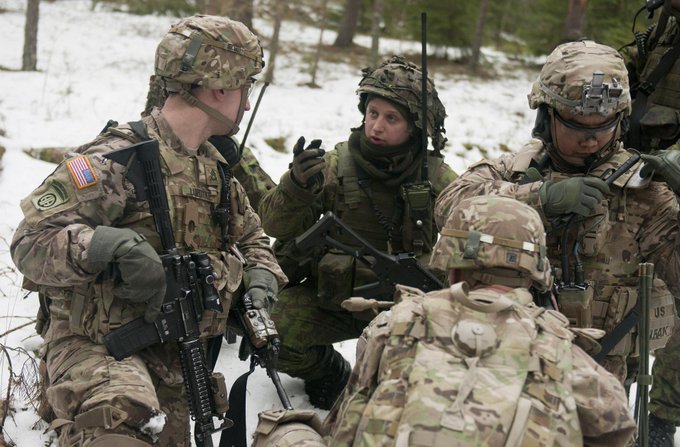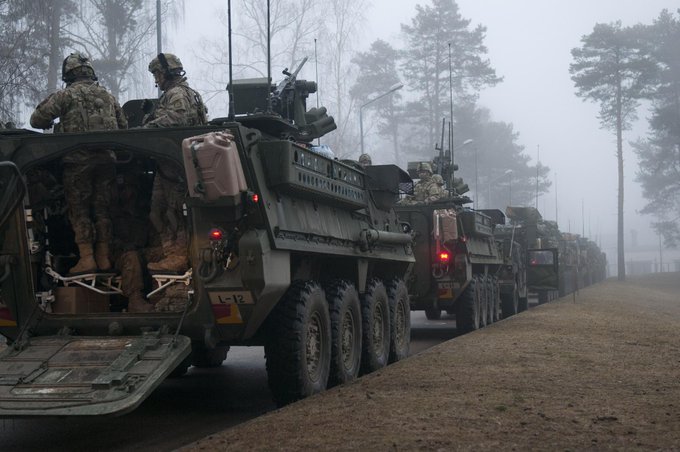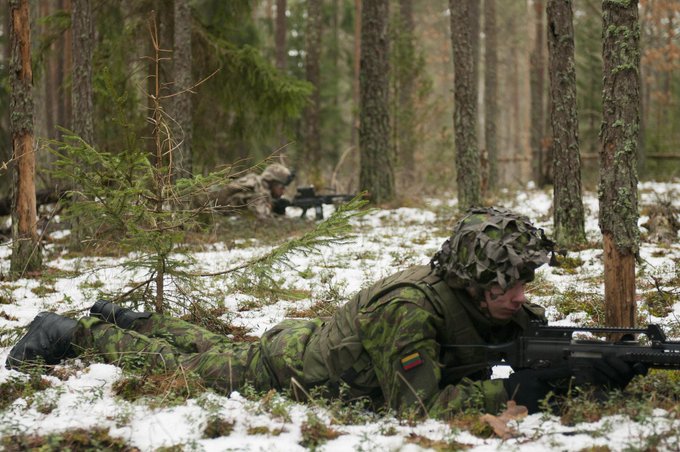Ray McGovern described being at CNN after Minsk 2.0 at the same time as Wolfowitz and Lieberman, them looking as if they were at a funeral. They didn't get their war.
The neo-cons are determined that Europe is not going to be at peace.
This is directed as much against Holland and Merkel as anyone else and represents a huge escalation in the conflict.
Make no mistake. This is very dangerous. These madmen are not going to back down and Putin is not going to either. Russia has its back to the wall and this is a struggle for her survival.
US
Plans to Send 300 Military Personnel to Train Ukrainian Soldiers
Approximately
300 US military personnel will be sent to a peacekeeping center in
Ukraine's western city of Lviv.
2
March, 2015
MOSCOW
(Sputnik) — The US Army will send some 300 military personnel to
Ukraine to conduct a joint training mission with the Ukrainian army
at a peacekeeping center near Lviv from March 5 until October 21,
according to a logistics contract solicitation posted on the army
acquisitions website.
The
US Army Contracting Command in Europe is looking "to award an
Indefinite Delivery Indefinite Quantity (IDIQ) service contract to
provide ground transportation between Lviv International Airport and
Yavoriv International Peacekeeping and Security Center (IPSC) for
United States Forces (USF)…for the period of eight months."
Russia
Warns NATO: Any Threat In Ukraine Will See Military Response
3
March, 2015
As Russia
announces the expansion of its Navy by 50 vessels this
year, including
two new nuclear-powered submarines and an aircraft carrier, it
appears NATO's sabre-rattling has drawn a response/threat/warning.
Following British plans to send military 'advisers' into Ukraine
(which NATO has stated are not confirmed), TASS reports, Russia's
NATO envoy, Alexander Grushko, warns Russia
will take all measures against possible NATO threat in Ukraine,
adding that Russia’s response may include
military measures.
NATO has taken no decisions on sending British or any other instructors to Ukraine, Russia’s Ambassador to the North Atlantic Alliance Alexander Grushko said on Monday.
"NATO has taken no decisions on sending instructors," he told the Rossiya 24 television channel. "NATO is implementing the decisions that were taken at the political level at the Wales summit in September 2014."
Moscow will take all measures, including military-technical, to neutralize possible threat from NATO presence in Ukraine, he added.
*
* *
And
this is happening as Russia dramatically expands its military
forces. As
The Moscow Times reports,
The Russian navy will receive 50 vessels of various sizes and classes this year, navy Chief Admiral Viktor Chirkov was quoted as saying by the Interfax news agency on Monday.
The new boats are part of a rearmament program begun under President Vladimir Putin that aims to provide Russia with a navy capable of operating far away from home — a capability lost after the collapse of the Soviet Union — by 2050. Russia's navy today is largely relegated to a coastal defense role.
"The period of stagnation in the development of our potential has long since passed," Chirkov said.
*
* *
And
here is The West's defence...
*
* *
Of
course all this military machismo comes as Russia and Ukraine hold
emergency talks in Brussels over gas supply amid imminent cutoff
threats for non-payment. As AP reports,
Russia and Ukraine's energy ministers are holding emergency talks after the Russian gas supplier said it would cut off deliveries to the war-torn country as soon as Tuesday if it does not get new payments.
The European Union, which is mediating the talks in Brussels hoping to keep gas flowing despite the dispute, imports around 40 per cent of its gas from Russia, half through conflict-torn Ukraine.
Kyiv and Moscow have fought out several gas price wars over the past years and concerns are mounting that any fresh cuts could again hit European supplies.
Cash-strapped Ukraine is struggling to buy time and made a $15 million payment last week, but Moscow says that will cover only a day's worth of gas, leaving a potential cutoff looming Tuesday.
Arriving for talks with his Ukrainian counterpart Volodymyr Demchyshyn and the European Union's energy chief Maros Sefcovic, Russian Energy Minister Alexander Novak acknowledged the "need to resume an energy dialogue."
Russia has said that it will cut supplies unless Kyiv pre-pays for gas it wants to use. Ukraine, meanwhile, accuses Russia of failing to abide by its contractual obligations.
Complicating the dispute are deliveries to Ukraine's rebel-held east, where fighting between Kyiv's forces and Russia-backed rebels has killed nearly 5,800 people.
Kyiv cut gas supplies to rebel-held areas last week, prompting Russia to pump gas there directly. Russia said those deliveries should be counted in gas exports to Ukraine.
*
* *
"Peace
Deal"?
NATO
rolls out 'Russian threat' in budget battle
RT,
2
March, 2015
NATO
member-states unwilling or unable to help boost the military spending
are being accused of ignoring the “Russian threat,” that has
re-emerged as the core of the alliance’s agenda to boost arms
sales.
A
report saying one of major NATO funding contributors, the UK, could
fail to fulfil the commitment to spend 2 percent of its GDP on the
alliance in 2015 came as a bombshell for some of the West’s
military elite.
The
head of the US army, General Raymond Odierno, told the Telegraph he
was “very concerned” about Britain’s possible defense cuts.
“[Odierno]
warned that, while the US was willing to provide leadership in
tackling future threats, such as Russia and ISIL [the Islamic State,
aka IS or ISIS], it was essential that allies such as Britain played
their part,” the British daily wrote.
Former
MI6 chief, Sir John Sawers, called for a rise in defense spending,
also mentioning the “threat” coming out of Russia “not
necessarily directly to the UK, but to countries around its
periphery.”
“The
level of threat posed by Moscow has increased and we have to be
prepared to take the defensive measures necessary to defend
ourselves, defend our allies - which now extend as far as the Baltic
States and Central Europe,” Sawers said, according to the Guardian.
In
turn, Moscow said it will take all “necessary measures” including
military, technical and political to neutralize a possible threat
from NATO presence in Eastern Europe, Russia's ambassador to NATO,
Aleksandr Grushko, told the Rossiya 24 TV channel on Monday. He added
NATO’s actions “significantly impair regional and European
security, and pose risks to our security.”
Grushko
said NATO has intensified its military drills in Eastern Europe, with
about 200 exercises in its eastern member states, mostly in the
Baltic and Black seas, Poland and Baltic states.
Russia's
Defense Ministry has consistently denied all reports of its personnel
or hardware being involved in the conflict in eastern Ukraine,
calling NATO's allegations “groundless.”
Among
“proof” of the “Russian aggression” there have been fake
photos of the Russian tanks, which eventually turned out to have been
taken in a different place at a different time, a supposed Russian
airplane in British airspace, that turned out to be Latvian, and
mysterious “Russian submarines” in Swedish waters - which never
were found.
“Demonizing”
Russia plays well into the hands of the military, believes former
NATO intelligence analyst, Lt Cdr Martin Packard.
“I
think this is a period when everybody is trying to get more money out
of their exchequers for upping the rearmament,” Packard told RT’s
‘In the Now’. “So that seems to be so in Britain, probably in
America too. Military forces in a way need to have an enemy. It suits
them to have an enemy.”
Germany
does not feel like increasing the military budget at any cost.
Minister of Finance, Wolfgang Schäuble, has recently agreed there
was a need to spend more on defense, but said that Berlin was not
going to do it at least before 2017, Bild am Sonntag reported.
Germany
has earlier voiced its concern over increasing defense spending to 2
percent of GDP.
"Germany
believes that the 2 percent requirement is unsuitable as an
assessment criterion to determine the loyalty of a member state to
the alliance,” a German Defense Ministry spokesman said in the wake
of NATO’s September summit in Wales. “We should talk less about
percentages of defense budgets and more about smart ways to obtain
better capabilities."
Together
with Italy and Canada, Germany is expected to spend $5.7 billion less
on defense in 2015 than in 2014, according to a report by the defense
and security think tank, European Leadership Network (ELN).
Following
talks with NATO Secretary General Jens Stoltenberg on Monday, French
President Francois Hollande said Paris currently opposes NATO’s
expansion.
While
bigger NATO members are being frugal in their defense spending, seven
smaller ones are significantly boosting military capabilities.
The
three Baltic states of Latvia, Lithuania and Estonia are in the
avant-garde. Others include the Netherlands, Norway, Poland and
Romania.
The
ELN report reveals that Estonia is the only country after the US to
meet the NATO target of spending 2 percent of GDP on the military.
Lithuania meanwhile will see a sharp one-third rise in its defense
budget.
All
of the Baltic States have big contracts for purchasing weapons from
their richer NATO allies.
Estonia
recently negotiated acquisition of the $55 million Javelin anti-tank
missile system. It has also signed what’s been described as “the
largest procurement contract ever" for purchasing 44 infantry
combat vehicles worth €138 million ($154 million) from the
Netherlands.
Latvia
is splashing out more than €54 million ($60 million) on a package
that includes 123 British combat vehicles. Lithuania bought a €34
million ($38 million) GROM air defense system from Poland in
September.
NATO’s
rhetoric is not in the least dictated by big business, according to
News Junkie Post Editor-in-Chief Gilbert Mercier.
“They
are going to increase their military spending and that’s precisely
the idea,” Mercier told RT. “There’s a minimum that you’re
supposed to spend when you are a NATO member, which is 2 percent of
your [GDP]. They will start getting into that level and increasing
it. The idea is for a NATO country to buy US military gear, if
possible or manufacture their own, but preferably buy F-15s or F-16s.
It’s always about money, always about profit.”









No comments:
Post a Comment
Note: only a member of this blog may post a comment.